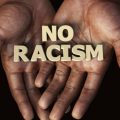
What impact has the Social Care Workforce Race Equality Standard had on your workplace?
- I'm not aware of the SC-WRES. (62%, 510 Votes)
- It hasn't been implemented in my workplace. (14%, 117 Votes)
- It has been implemented but has had no impact. (11%, 90 Votes)
- It has been implemented, but it's too early to tell. (8%, 63 Votes)
- It has been implemented and has had a positive impact on tackling racial inequalities. (5%, 37 Votes)
Total Voters: 817
Black, Asian and minority ethnic social care staff continue to face worse outcomes than white colleagues in English councils across most indicators, Skills for Care research has revealed.
Council staff from minority groups fared less well than white counterparts on most of nine indicators designed to measure racial inequalities, including in relation to recruitment, pay, progression and being subject to disciplinary processes.
However, the report found that they were less likely than white staff to have been subject to bullying or harassment, contrary to previous research findings, though this was based on a small sample size.
The Social Care Workforce Race Equality Standard
The findings were set out in the report of the 2024 Social Care Workforce Race Equality Standard (SC-WRES), a programme to identify inequalities in local authorities’ adults’ and children’s services workforces so councils can develop plans to tackle them.
The latest SC-WRES was based on returns from 73 councils, all of which provided at least some data on their adult social care workforces, with 43 submitting some figures on their children’s workforces.
For six of the nine indicators, more than half of participating councils submitted data for the 2024 report. Five of these – pay, being appointed from a shortlist to a role, entering a disciplinary process, staff turnover and being in senior management – showed worse outcomes for black, Asian and minority ethnic staff.
Poorer outcomes for minority ethnic staff
Compared with white staff, they were:
- 48% less likely to have been appointed to a role from a shortlist, a similar rate to that in 2023;
- 37% more likely to have entered a formal disciplinary process in the previous 12 months, compared with 40% in 2023;
- 21% more likely to have left their role in the previous 12 months, up from 10% in 2023;
- 45% less likely to be in senior manager roles.
They were also underrepresented among those earning £70,000 or more, with 14% doing so, compared with their 21% representation in the workforce of responding local authorities.
There was little difference between white and minority ethnic staff in access to non-mandatory continuing professional development (CPD), with the latter being 5% more likely to have received this form of training in the previous 12 months than the former.
The make-up of English councils’ social care workforces
- 81% of adult social care staff were white, as of 2023-24, in line with the wider population as measured by the 2021 census. However, 69% of adults’ social workers and 74% of children’s social workers were white, below their representation in the population.
- 10% of adult social care staff, 20% of adults’ social workers and 15% of children’s social workers were black, compared with 4% of the population.
- 6% of adult social care staff and 7% of children’s and adults’ social workers were Asian, compared with 10% of the population.
- 2% of adult social care staff, 3% of adults’ social workers and 4% of children’s social workers were from mixed or multiple ethnic groups, compared with 3% of the population.
- 1% of adult social care staff, adults’ social workers and children’s social workers were from other ethnic groups, compared with 2% of the population.
Source: Skills for Care
Differences by ethnic group and service
Across these six indicators, there were differences in outcomes between staff in adults’ and children’s services and between those from different racial groups.
For example, while black, Asian and minority ethnic adult social care staff were 19% more likely to enter a formal disciplinary process than white workers, those in children’s services were 67% more likely to do so than their white counterparts.
And across both services, black staff were significantly more likely than those from other minority ethnic groups to be subject to a disciplinary process. For example, in children’s services, they were 84% more likely than white staff to do so, compared with 60% more likely for Asian staff and 55% more likely for those from mixed or multiple ethnic groups.
The 2024 SC-WRES also reported on racial disparities in relation to regulated staff entering fitness to practise process and workers experiencing bullying or harassment, whether from colleagues or managers, or from people using services, relatives or members of the public.
Findings on fitness to practise cases and bullying
The report said black, Asian and minority ethnic staff in adults’ services were 8% more likely to have entered an fitness to practise (FtP) process in the previous 12 months, while those in children’s services were 114% more likely to have done so, compared with white staff.
However, just 27 of the 73 councils supplied data on adults’ services, with 17 doing so for children’s services, with many authorities not collecting data on the ethnicity of those who had entered the FtP process.
Meanwhile, data from staff surveyed showed black, Asian and minority ethnic workers were 36% less likely than white staff to have experienced harassment, bullying or abuse from people using services, relatives or members of the public in the previous 12 months. They were also 28% less likely to have experienced harassment, bullying or abuse from colleagues or managers in the previous 12 months than white workers.
This is contrary to the findings of the 2023 SC-WRES, which reported that black, Asian and ethnic minority staff were more likely to have experienced bullying, harassment or abuse from both the public and from workmates.
However, as with the FtP data, the 2024 findings were based on a small sample size and response rate (13 adults’ employers and seven children’s employers for the question on bullying by the public, and 10 adults’ employers and seven children’s employers for the one relating to colleagues).
Skills for Care sounds warning over low response rates
Skills for Care warned that such small sample sizes and low response rates meant the results may not be representative of the wider sector and may be more prone to being skewed by a small number of councils with unusual results.
Alongside the report, Skills for Care runs an improvement programme to enable authorities to use the data, along with learning from fellow councils involved in the SC-WRES, to develop action plans tackle racial inequalities in their workforces.
The workforce development body said it would work with local authorities to collect more data on both FtP and staff experiences of bullying, harassment and abuse for future SC-WRES reports.
Its chief executive, Oonagh Smyth, said: “Each year, as the number of organisations participating in the SC-WRES grows, we’re able get a clearer understanding of the inequality present in our sector.
“As the programme continues, we’ll see even more comprehensive action plans being developed and implemented that lead to better experiences and outcomes for people from minoritised backgrounds.”
Impact of SC-WRES ‘not being fully felt at front line’
Skills for Care’s work in this area is informed by the Independent Advisory Group (IAG) for the SC-WRES, a group of black, Asian and minority ethnic practitioners, leaders, academics and people with lived experience.
Its co-chair, Tricia Pereira, previously Skills for Care’s director of operations and a former principal social worker, said the group welcomed the increasing number of councils signing up to the SC-WRES, as this showed “a sector-wide recognition of racial inequalities and a willingness to take action”.
However, she warned: “We continue to hear from global majority professionals working within social care about persistent experiences of discrimination and racism in their organisations. Many share that while the SC WRES provides a mechanism for accountability, the impact is not yet being fully “felt” at the front line.”
Councils ‘must hold one another to account on anti-racism’
To “drive meaningful, tangible change”, the advisory group strongly wanted to see “a sector-led, peer-review collaborative model”, where councils “not only support one another but also hold each other to account on their journey towards becoming anti-racist organisations”.
Pereira said the group was committed to working with Skills for Care and social care leaders “explore how a peer-led approach can strengthen implementation, impact, and accountability”.
Advisory group co-vice chair Meera Spillett, who helped devise the Black and Asian Leadership Initiative (BALI), the Staff College scheme designed to improve opportunities for aspiring leaders from minority groups in children’s services, said there had been a lack of progress over the past decade.
Spillett, a former director of children’s services, said: “Many [global majority leaders] are undermined, silenced and are consistently negatively reframed. Despite the wealth of experience they have, many are overlooked for appointment, given over generalised feedback. The BALI alumni still sees some white leaders recruiting from their white networks without due process in their appointments.”
She said some councils were showing progress on anti-racism, adding: “Shared ownership and leaders who recognise “it starts with me” have seen progress and will relentlessly continue to tackle inequities.”
Chief social workers urge action on SC-WRES results
The report on 2024 SC-WRES included comments on the results from both of the government’s chief social workers, Sarah McClinton (adults) and Isabelle Trowler (children and families).
McClinton said the findings pointed to “underlying systemic inequalities that can undermine confidence, wellbeing and progression” among black, Asian and minority ethnic staff.
“Addressing this is not just about improving workforce dynamics – it’s about better outcomes for the communities we serve,” she added, as “an inclusive workforce is key to building trust with diverse communities”.
Trowler said: “This SC-WRES report raises significant questions about race equity in the children’s workforce, particularly around potential barriers to progression and contribution at senior levels. It is vital that we take these findings seriously and work collectively to ensure that opportunity, recognition, and career progression are truly equitable for all those working in children’s social care.”
How directors’ bodies responded
For the Association of Directors of Children’s Services (ADCS), president Rachael Wardell said the findings reinforced the truth that “structural inequalities [were] still deeply embedded” in the recruitment, progression and experiences of black, Asian and minority ethnic staff.
She said the results were a “call to action” to deliver “sustained, systemic change”.
Her counterpart at the Association of Directors of Adult Social Services (ADASS), Jess McGregor, said the report revealed a “need to improve representation in senior management roles among people from black and ethnic minority groups”.
“To build an equitable and inclusive social care system which meets the needs of everyone in our community, we need a strong, diverse group of leaders,” she added.






 Bournemouth, Christchurch and Poole
Bournemouth, Christchurch and Poole  Hampshire County Council
Hampshire County Council  Oxfordshire County Council
Oxfordshire County Council  South Gloucestershire Council
South Gloucestershire Council  Wokingham Borough Council
Wokingham Borough Council  The highs and lows of a children’s services’ transformation journey
The highs and lows of a children’s services’ transformation journey  Embedding learning in social work teams through a multi-agency approach
Embedding learning in social work teams through a multi-agency approach  The family safeguarding approach: 5 years on
The family safeguarding approach: 5 years on  Harnessing social work values to shape your career pathway
Harnessing social work values to shape your career pathway  Workforce Insights – showcasing a selection of the sector’s top recruiters
Workforce Insights – showcasing a selection of the sector’s top recruiters  Free CPD on Parkinson’s for health and social care staff
Free CPD on Parkinson’s for health and social care staff 

 Facebook
Facebook X
X LinkedIn
LinkedIn Instagram
Instagram
No comments yet.